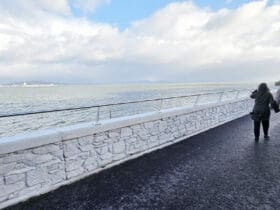The long awaited jubilee bank holiday weekend is upon us and with it comes the chance to get away for a few days. However, it is important that motorists stay safe when getting away this bank holiday. The experts at National Scrap Car have put together a few tips to help motorists get through the bank holiday rush safely.
-
Do the essential checks before setting off
Before setting off on any long journey motorists should always take the time to do the essential checks on their vehicles, particularly if this is their first long trip since winter ended.
The essential checks include:
-
Tyre pressure and condition
-
Oil levels
-
Headlights and brake lights
-
Wiper blades
If you are unsure of your car’s recommended tyre pressure, consult your manual. Similarly, ensure you top up your oil with the recommended for your vehicle to guarantee better engine performance.
-
Plan your route ahead
It is no secret that fuel costs are extremely high at the moment, which means making sure you have the best route possible planned ahead is essential for fuel consumption and for an easier journey.
But fuel consumption shouldn’t be the only factor considered. Take a look at the different routes to your destination and weigh up the options based on your requirements. For example, if you are someone that requires regular breaks, a route that may be longer but have more service stations along it or opportunities to stop is the best route.
Check your route the day before leaving too to ensure there haven’t been any changes such as road closures that will affect your trip.
-
Avoid peak travel times
As obvious as it sounds, avoiding peak times is the best way to avoid the bank holiday rush. This may mean sacrificing time in bed and hitting the road early or opting for a late night drive the day before your break.
You can get an idea of when a road is usually busy by using Google Maps. If you type your destination it will let you know how long the route typically takes and will show areas that are usually more congested during your estimated journey time by highlighting them in orange or red.
Amy Josling, car and scrappage expert at National Scrap Car, said: “The bank holiday is notorious for causing congestion issues for motorists, which is why planning ahead is key to getting through your drive there and back safely. Drivers should ensure that their route is planned prior to setting off and, if they can, avoid hitting the road during the peak travels times. On a weekday, such as Friday, these peak times are 6am-10am and 4pm-8pm. If you are travelling on the Saturday however, early morning such as before 8am or after 6pm is best. The less traffic on the roads the safer the journey.”
-
Stop for regular breaks
Long journeys can be very tiring for motorists, having to be “on” for the whole journey to ensure the safety of those in the car takes its toll. This is why it is important to plan in regular breaks along longer trips.
Stop for food and drink to make sure you are staying hydrated and fed to keep you focused, and if you are planning on leaving later at night to avoid the rush, try and have a nap prior to setting off. Driving tired is very dangerous, particularly if you are planning a short break somewhere rural, as there are likely to be fewer street lights.
-
Keep the traffic function on your radio
Most vehicles have a traffic function on their entertainment systems that will interrupt bluetooth music and such to give updates. On shorter and every day trips the interruptions can be frustrating but it is important to keep this on for your longer journeys.
Some cars will have map apps that will automatically update to accommodate for any delays or disruptions but having the function on will allow you to be fully informed on your travels.
-
Have breakdown cover
To avoid being stranded while far away from home, take out breakdown cover.
Breakdown cover is a type of insurance you take out in case your vehicle breaks down. It is extremely useful to have when embarking on longer trips, if you get a flat car battery or a punctured tyre or even more severe faults for example that cause you to get stuck, having breakdown cover will mean that the fault is either fixed at the roadside or you will be recovered with your vehicle and taken somewhere they can fix it or home
You can either purchase breakdown cover as an individual policy, or it can be offered as part of your motor insurance or even bank account. Check what is available and compare, like travel insurance, it is better to have it and not need it than to be without.
-
Know your limits the night before driving home
Bank holidays are synonymous with barbeques and having one too many drinks, however if you are planning to drive you need to be aware of your limits the night before/ day of driving home.
It’s around three hours after each drink if you drink one large glass of wine (250ml/three units) or a higher-strength lager, beer or cider (5.2%) before the alcohol leaves your system.
The maximum BAC (blood alcohol content) limit in England & Wales is:
-
35 micrograms of alcohol per 100 millilitres of breath; or
-
80 milligrams of alcohol per 100 millilitres of blood or
-
107 milligrams of alcohol per 100 millilitres of urine
The maximum BAC (blood alcohol content) limit in Scotland is:
-
22 micrograms of alcohol per 100 millilitres of breath; or
-
50 milligrams of alcohol per 100 millilitres of blood or
-
67 milligrams of alcohol per 100 millilitres of urine
Being in charge of a vehicle while above the legal limit is a serious offence and can result in 3 months imprisonment, a fine of up to £2,500 and in some cases, a life-long driving ban.









Leave a Reply
View Comments